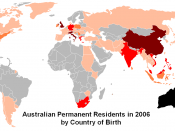Discussion"(n) immigration, in-migration (migration into a place (especially migration to a country of which you are not a native in order to settle there))"World Net Princeton University DictionaryImmigration has been crucial for the economic advancement and expansion of the nation. "People have been immigrating to Australia for many years." Immigrants flood our gates from all over the world to be a part of the lucky country and the home of the brave. "Australia has, is, and will always be a nation of immigrants; the great melting pot." Immigrants find food, shelter, relief from persecution, and a chance at a life of their own.
There are a wide range of views in the Australian society on the level of immigration, and on the possible effects of changing the level of immigration and population growth. In 2002 a CSIRO study of populations entitled "Future Dilemmas" examined the outcomes of the impact of immigration in Australia. These dilemmas included the numbers of aged continuing to rise despite high immigration off-setting ageing and declining birth-rates in a proportional sense, a worsening of Australia's trade balance due to more imports and higher consumption of domestic production, increased green house gas emissions, overuse of agricultural soils, marine fisheries and domestic supplies of oil and gas and a decline in urban air quality.
Both major Australian political parties favour a relatively high level of immigration. When John Howard became Prime Minister, net migration was rising, and the upward trend in the number of immigrants increased over the decade from when he took office in 1996. According to Banham, Australian political leaders who support higher immigration include Amanda Vanstone, John Howard, Peter Costello, Kim Beazley, and Steve Bracks, with vocal opposition to immigration coming from former New South Wales premier Bob Carr who cites environmental reasons...


